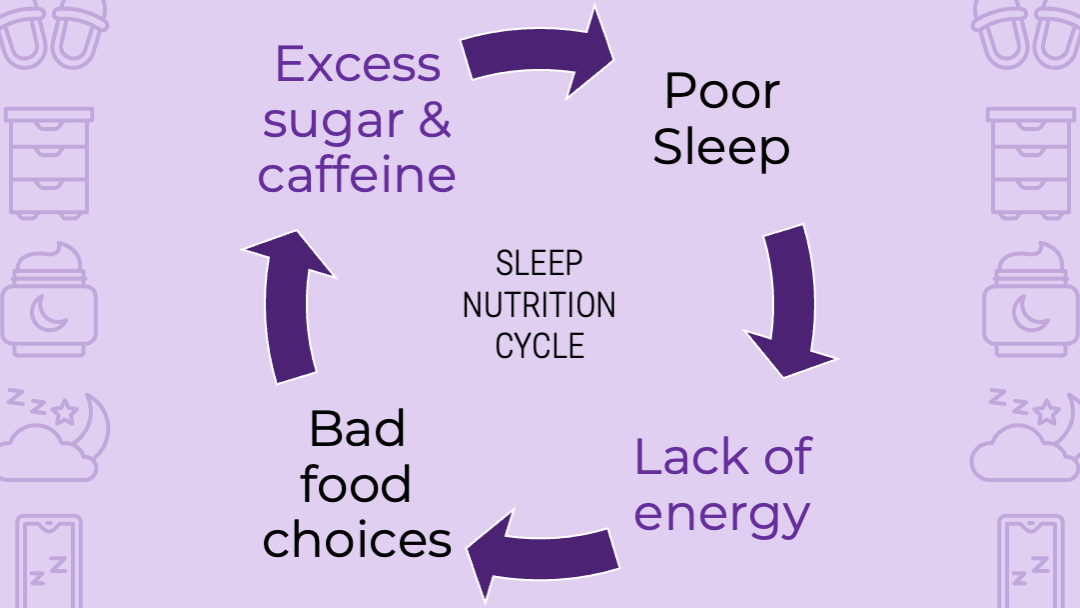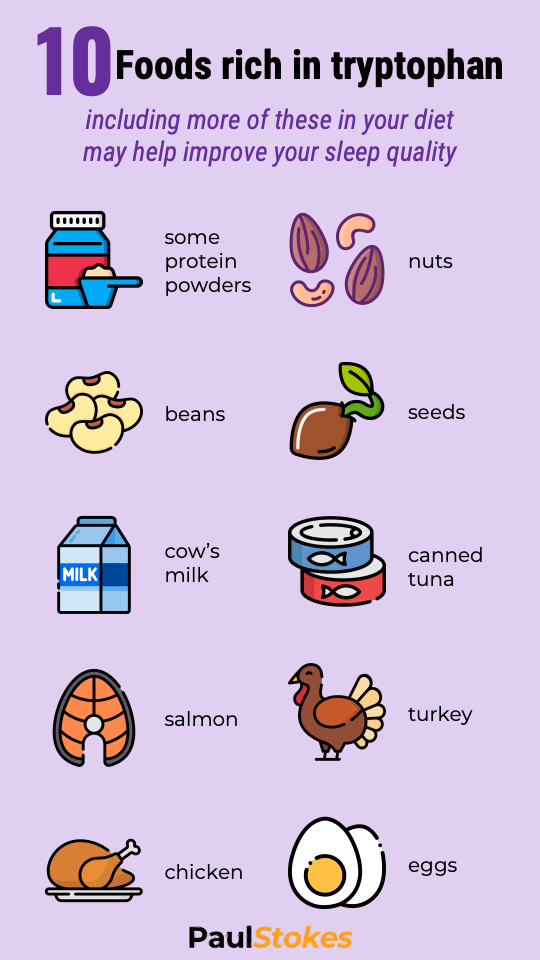I'm sure I'm not the first to tell you that what you eat and how you sleep both have massive effects on your overall health. But did you know your diet and nutrition choices affect the quality of your sleep? Furthermore, the amount of and effectiveness of your sleep pattern can influence how and what you eat too. Read on to learn more about how sleep and nutrition are connected.
More...
Have you ever had one of those days where you're so tired you feel you need some sugary snacks just to get by? Maybe it's the afternoon slump where you need a coffee and a sweet treat to pick you up. How about the mornings you wake up feeling like you hardly slept a wink, even though you went to bed at your normal time?
Introducing the Sleep Nutrition Cycle
You can get caught up in a downward cycle. You don't sleep well. The next day you respond by eating junk to perk up your energy levels. That night, you sleep badly again as your brain is buzzing from all the caffeine and sugar.

It's easy to forget that what we eat affects not only our energy levels but also how well we sleep too.
It works both ways though - how well you sleep influences your dietary choices, habits and food intake patterns.
When it comes to your performance in the gym, your nutrition and sleep both have a huge impact.
A sports diet designed to fuel performance will generally consist of high-quality protein at regular intervals throughout the day. You'll also find carbohydrates to support training needs as well as healthy fats with lots of fresh fruits and vegetables too.
For optimal performance, it's important to approach your sleep routine with the same focus on structure and habit. In general terms, you'll want to aim for 7 to 9 hours per night.
Now, hands up if you actually get that much sleep regularly.
I'll wait.
How food and nutrition choices affect your sleep
Below are some ways you can adapt your diet to enhance your sleep
Caffeine improves performance but hinders sleep
Predominantly found on coffee, tea, energy drinks, chocolate and pre-workout supplements. Research shows that caffeine improves athletic performance however too much alters the quality and quantity of your sleep.
Caffeine has a 'half-life' where it's broken down and its effects wear off over time. It can take up to 12 hours for your body to completely remove caffeine from your system. Think about that the next time you wander off to the coffee machine at 3pm.
Similarly, if you train in the evenings, caffeine may help you perform better during your session. You'll pay the price though with reduced sleep quality.
As a result, your recovery, and subsequent training performance, may suffer.
Hydration levels and fluid intake are important to train well and sleep well
Adequate hydration is crucial to allow your body and mind to perform well. However, drinking excess amounts of fluid in the run-up to bedtime can result in broken sleep. Frequent trips to the bathroom will severely disrupt your sleep quality.
Play about with how much and when you take on fluids. You may find you are able to maintain optimal hydration levels through the day yet still sleep soundly at night.
Portion size and large late-night meals weigh your digestion down
Big meals force your digestive system to work overtime. Your organs and processes have to work a little harder to digest the food you've consumed.
If your stomach is still having to churn its way through a large meal, it's going to be harder for your body to drift off to sleep.
Ideally, we want to minimise the work our digestion has to go through late at night. The timing of our nutrition intake really does have an impact on how well we sleep.
Best practice is to allow time for your last main meal to digest before heading off to bed. If you have to eat soon before bedtime, make it a light meal or snack.
Foods rich in tryptophan may help your sleep cycle
You may have heard of tryptophan before. It's an amino acid your body uses to make serotonin and melatonin.
Serotonin is the "feel good" chemical, melatonin is the make hormone that regulates your circadian rhythm.
Some research shows that by consuming a meal high in tryptophan before bed, we can improve the quality of our sleep.

Including more tryptophan-rich foods in your diet may improve sleep quality
Foods high in tryptophan include some protein powders, nuts, beans, seeds, cow's milk, canned tuna, salmon, chicken, turkey and eggs.
Alcohol affects your sleep, and not in a good way
You may be under the impression that drinking helps you sleep. Actually, it reduces the quality of your sleep.
By drinking alcohol, your body spends less time in the REM phase of sleep. This Rapid Eye Movement phase is the restorative part of your sleep cycle.
By reducing time spent in REM, you'll wake up feeling less restored in the morning.
How much alcohol does it take to negatively influence your sleep? Just a single beer or glass of wine can have an effect on your sleep quality.
READ ALSO: Alcohol and Exercise Performance
How our sleep quality affects nutrition
The link between how nutrition affects sleep works the other way too.
Diet habits, behaviour and food choices influenced by sleep quality
The decisions we make about food are affected by how much and how well we sleep.
Research shows that when we are sleep-deprived we eat more junk food. In seeking out reward and gratification, our body craves highly-processed foods lacking in nutrients.
Additionally, we show less restraint and may eat these foods in larger portion sizes than we would otherwise.
Poor sleep quality can result in an insatiable appetite and bad diet
Our hunger hormones are regulated by our sleep patterns too.
Poor sleep causes ghrelin hormone levels to rise, with leptin levels decreasing. Consequently, you'll feel hungrier.
As a result, you'll eat more food, have a higher energy intake and generally reach for more carbohydrate-rich meals and snacks.
Your body processes carbohydrates differently after poor sleep
Bad sleep can affect how your body breaks down glucose. Additionally, your insulin sensitivity can also fluctuate.
This can have strong implications when it comes to chronic diseases like Type 2 diabetes.
Not to mention gaining weight and rising body fat levels.
How nutrition affects sleep - eat smart, sleep well, live healthily
Your diet and nutrition influence the quality and quantity of your sleep.
Particular foods and drinks make it easier or harder for your body to get adequate sleep.
Conversely, people who get enough sleep tend to maintain healthier lifestyles at appropriate body weight.
If you struggle with your weight or eating habits, take a look at your sleeping patterns.
Once we recognise the connection between how we eat and how we sleep, we have an opportunity to improve both.
Sleep well.
READ ALSO: Five Great Tips for Better Sleep
